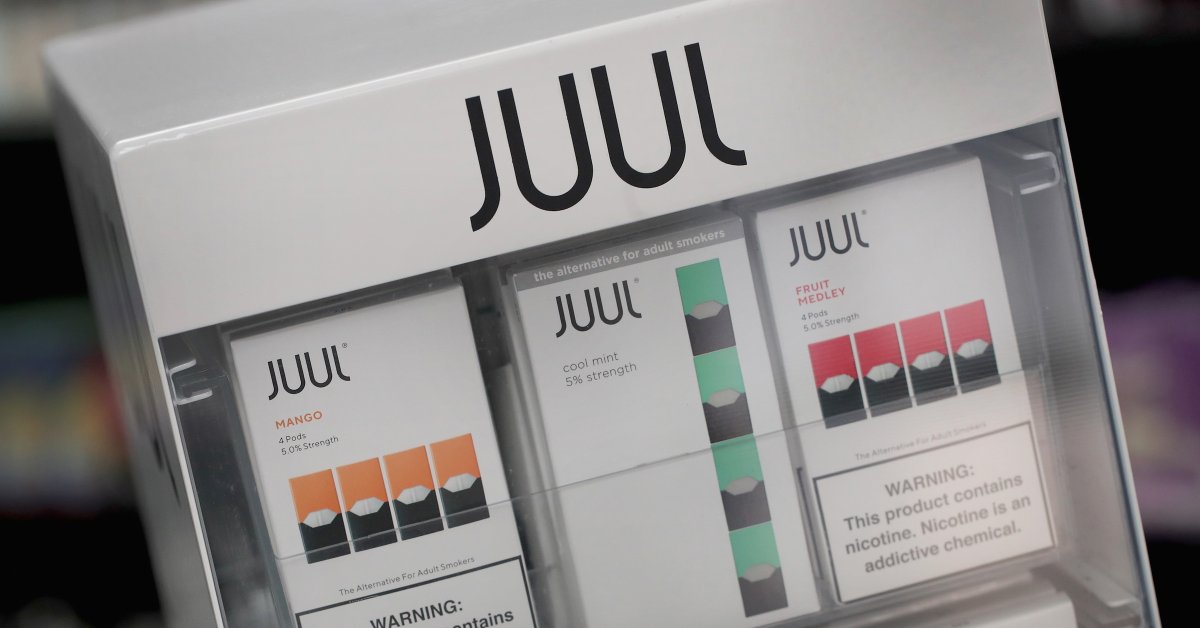[ad_1]
(DURHAM N.C.) — Electronic cigarette giant Juul Labs Inc. will pay $40 million to North Carolina and take more action to prevent underage use and sales, according to a landmark legal settlement announced Monday after years of accusations that the company had fueled an explosion in teen vaping.
A state judge accepted the first-of-its-kind agreement with a state. North Carolina Attorney General Josh Stein had sued Juul, accusing it of employing unfair and deceptive practices that targeted young people to use its vaping products, which deliver addictive nicotine. The lawsuit had been scheduled for trial next month.
[time-brightcove not-tgx=”true”]
As part of the agreement, Juul will not advertise to anyone under 21 in North Carolina, including through social media, and will limit sales amounts of Juul products online to any state residents. It will also sell its products only behind counters at retailers that have ID scanners to ensure customers are of age.
Teen use of e-cigarettes skyrocketed more than 70% after Juul’s launch in 2015, leading the U.S. Food and Drug Administration to declare an “epidemic” of underage vaping among teenagers. Health experts said the unprecedented increase risked hooking a generation of young people on nicotine, an addictive chemical that is harmful to the developing brain.
“Juul sparked and spread a disease — the disease of nicotine addiction. They did it to teenagers across North Carolina and this country simply to make money,” Stein, a Democrat, said after a brief court hearing. “Today’s court order will go a long way towards ensuring that their e-cigarettes product is not in kids’ hands, its chemical vapor is out of their lungs, and that the nicotine does not poison or addict their brains.”
Read more: How Juul Got Vaporized
Juul, which is partially owned by Altria Group Inc., has seen sales fall after already halting all advertising and social media promotion and pulling most of its flavors except for menthol.
“This settlement is consistent with our ongoing effort to reset our company and its relationship with our stakeholders, as we continue to combat underage usage and advance the opportunity for harm reduction for adult smokers,” Juul said in a statement after the court hearing. “We seek to continue to earn trust through action.”
Several states have filed their own lawsuits against Juul. A group of 39 state attorneys general have been cooperatively investigating the company’s marketing and products since February 2020.
Juul also faces hundreds of personal injury lawsuits from customers and families of young people who said they were hurt or addicted by the company’s products. Those have been consolidated in a California federal case.
Juul already had taken a legal beating this spring in the North Carolina case. Superior Court Judge Orlando Hudson declared in May that the company had destroyed documents and ignored court orders, leading to possible massive monetary sanctions.
Teen vaping dropped significantly last year, according to the federal Centers for Disease Control and Prevention. In a national survey, just under 20% of high school students said they were recent users of electronic cigarettes and other vaping products, down from about 28% in 2019.
Experts point to restrictions on flavors along with a new federal law that raised the age limit for all tobacco and vaping sales to 21.
Anti-vaping advocates welcomed the decision. But they said more restrictions are needed to curb teen use, including banning menthol from Juul and all other e-cigarettes. Stein also urged the FDA to step in.
“The evidence is clear that Juul’s high-dose nicotine products caused the youth e-cigarette epidemic,” said a statement from Matthew Myers of the Campaign for Tobacco-Free Kids. “The evidence is also clear that menthol flavor appeals to kids and kids shifted to menthol products.”
Monday’s settlement, which Hudson signed, also directs “secret shopper’ visits to stores by young people to ensure the restrictions are being carried out. The $40 million, to be paid over six years, will be earmarked by the state for vaping cessation and prevention programs, and for e-cigarette research.
Stein filed the lawsuit in state court in Durham, a central North Carolina city that is home to Duke University. Both the city and the school grew substantially in the 20th century thanks to tobacco production. North Carolina still remains the No. 1 producer of flue-cured tobacco in the country.
The connection to Durham wasn’t lost on Stein, who said he recalls traveling to the city to tour the now-shuttered Liggett & Myers cigarette manufacturing facility when he was in elementary school.
“The whole town smelled of tobacco,” Stein told reporters after the hearing. “When we thought about bringing this case, we thought that there was some symbolism to bring it here.”
___
AP health writer Matthew Perrone in Washington contributed to this report.
[ad_2]
Source link





